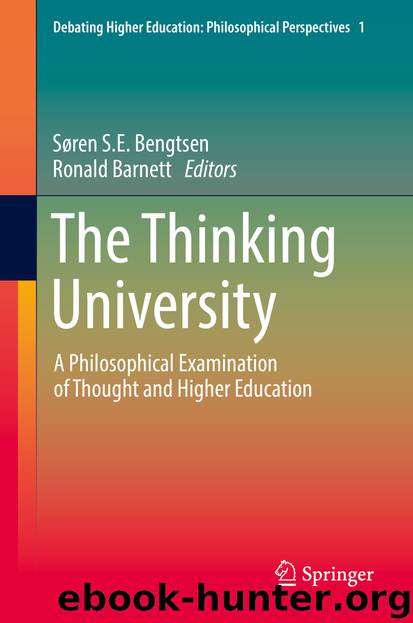The Thinking University by Søren S.E. Bengtsen & Ronald Barnett

Author:Søren S.E. Bengtsen & Ronald Barnett
Language: eng
Format: epub
Publisher: Springer International Publishing, Cham
Citizenship and the Thinking University: Toward the Citizen Scholar
Any university that wishes to be of and for thought needs to consider how teaching and learning is fostered. Based on the considerations of Heidegger and Freire discussed above, we contend that it is necessary for a thinking university to develop curricula and pedagogical stances that challenge students to apply their knowledge, to innovate, and makes them aware and interested in understanding and changing the societal structure in which they live. Universities need to create space to inculcate skills and cultural practices that pushes students to think beyond their disciplinary knowledge, enabling them to address societal problems and needs; they need to foster citizen scholars (Arvanitakis and Hornsby 2016).
The citizen scholar encapsulates the idea that the role of universities is both to promote scholarship as well as active and engaged citizens who think about the society around them (Arvanitakis and Hornsby 2016). Citizen scholars aim to live an ethical and fulfilled life, continue in the pursuit of knowledge, and are prepared to question the status quo, and engage with the community. They treat information and knowledge critically and aim to improve society. In short, they think.
By maintaining curricula or teaching that narrowly focuses on the content of disciplines, universities only enhance disciplinary knowledge and reinforce disciplinary boundaries. This narrows thinking as opposed to inculcating an understanding across disciplines and the importance of gaining not only knowledge but also cultivating wisdom.1 By advocating learning environments that place at their core particular proficiencies and attributes that the learning environment is meant to foster, it is suggested that the place of thinking in higher education can be renewed and reinvigorated.
To do this we suggest a pedagogical stance that moves us towards a practice of developing graduate attributes and proficiencies, in addition to disciplinary knowledge.
We have identified a number of proficiencies and attributes inherent in the citizen scholar, which are proposed to be essential in establishing the thinking university. For conceptual clarity, these are separated into four ‘Proficiency Clusters’ with underlying or relevant attributes.
Download
This site does not store any files on its server. We only index and link to content provided by other sites. Please contact the content providers to delete copyright contents if any and email us, we'll remove relevant links or contents immediately.
Spare by Prince Harry The Duke of Sussex(5172)
Navigation and Map Reading by K Andrew(5147)
Tuesdays with Morrie by Mitch Albom(4762)
Machine Learning at Scale with H2O by Gregory Keys | David Whiting(4289)
Cracking the GRE Premium Edition with 6 Practice Tests, 2015 (Graduate School Test Preparation) by Princeton Review(4270)
Never by Ken Follett(3928)
Goodbye Paradise(3795)
What It Really Takes to Get Into Ivy League and Other Highly Selective Colleges by Hughes Chuck(3737)
Fairy Tale by Stephen King(3364)
Harry Potter and the Prisoner of Azkaban (Book 3) by J. K. Rowling(3346)
Pledged by Alexandra Robbins(3167)
Kick Ass in College: Highest Rated "How to Study in College" Book | 77 Ninja Study Skills Tips and Career Strategies | Motivational for College Students: A Guerrilla Guide to College Success by Fox Gunnar(3108)
Reminders of Him: A Novel by Colleen Hoover(3067)
A Dictionary of Sociology by Unknown(3065)
Sapiens and Homo Deus by Yuval Noah Harari(3057)
The Social Psychology of Inequality by Unknown(3013)
Graduate Admissions Essays, Fourth Edition: Write Your Way into the Graduate School of Your Choice (Graduate Admissions Essays: Write Your Way Into the) by Asher Donald(2905)
Will by Will Smith(2898)
Zero to Make by David Lang(2774)
